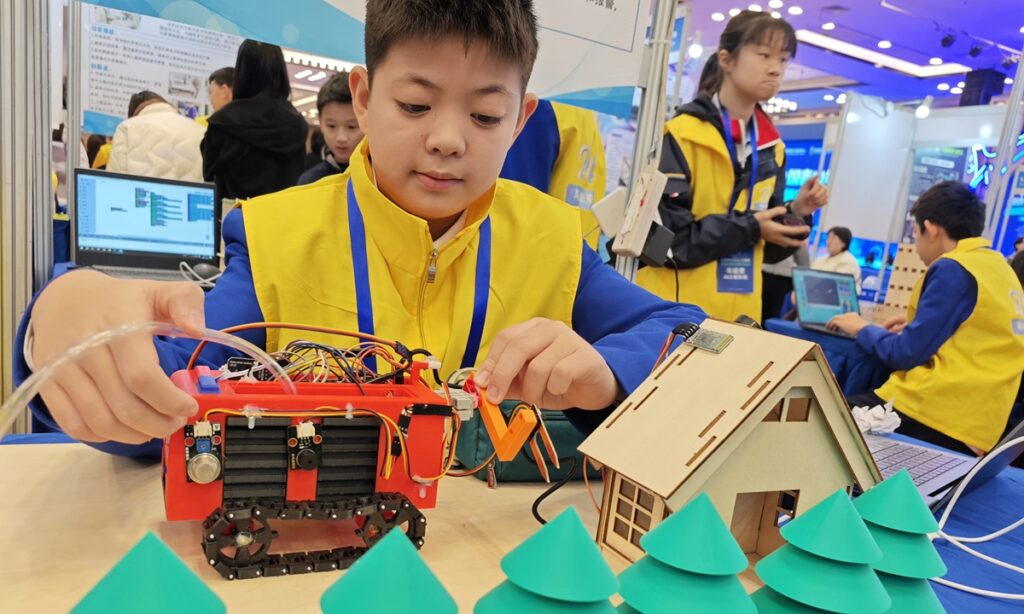Let’s be honest — not everyone has the time (or patience) to spend hours writing…

AI Education in China: How the Future is Being Built in Classrooms
China is not just racing ahead in artificial intelligence (AI) development—it’s also investing deeply in AI education to prepare its youth for a technology-driven future. From coding robots in elementary schools to AI labs in top universities, China is reshaping its education system to align with the global AI revolution.
For students across the world, especially in developing countries, there are many lessons to be learned from China’s fast and futuristic approach to AI learning. It’s not just about machines—it’s about preparing minds.

1. Government-Driven AI Strategy
China’s Ministry of Education introduced a national plan in 2018 to include AI courses in schools and universities. Since then, AI has been added to national curriculums, textbooks have been revised, and new training programs for teachers have been launched.
The government wants China to become the global leader in AI by 2030. That’s not just a goal—it’s a carefully crafted strategy supported by billions of dollars in research funding, tech partnerships, and international collaboration.
2. AI in Primary and Secondary Schools
Chinese school students are now being introduced to AI concepts such as machine learning, robotics, facial recognition, and natural language processing at a young age. Schools in cities like Beijing and Shanghai even use smart classrooms with AI-based attendance and performance tracking.
Kids build robots, write simple Python code, and use gamified learning apps that teach them real-world AI applications. That’s way more advanced than what many high schoolers in other countries are exposed to.
3. University-Level AI Programs
Top Chinese universities like Tsinghua, Peking, and Zhejiang now offer dedicated AI majors, master’s, and PhD programs. These institutions are collaborating with global tech companies such as Alibaba, Huawei, and Tencent to provide real-world projects and internships for students.
China’s National Open University also offers online AI courses to increase accessibility. Student’s can learn neural networks, AI ethics, and algorithm design from the comfort of their homes.
4. The Role of Private Tech Giants
Chinese tech companies are also playing a big role in AI education. Baidu, for example, launched an AI curriculum called “Baidu Brain” for students. Tencent created an AI curriculum for vocational schools. Alibaba developed online AI certifications available through its platform.
These companies are not just creating consumers—they’re creating future AI engineers, developers, and entrepreneurs.
5. Challenges in AI Education
Despite all the progress, AI education in China faces challenges too. There’s a shortage of skilled teachers, especially in rural areas. The pace of change is fast, and curriculums need constant updating. Also, ethical concerns around facial recognition and surveillance in schools has raised eyebrows.
However, the government and institutions are working to close these gaps and ensure responsible, high-quality AI education.
6. What Students Around the World Can Learn
China’s proactive approach to AI education shows the importance of preparing early. It also proves that collaboration between government, academia, and industry can fast-track innovation. Other countries can adapt similar models and make AI education available to all.
AI is not just a career option—it’s becoming a basic skill. Learning it early will be a game changer for any student.
MakeMyAssignments supports students in exploring modern subjects like Artificial Intelligence by offering academic assistance in writing, research, and concept understanding. Whether you’re writing a paper on AI education trends or need help learning technical terms, our team can simplify complex topics for you. We also assist with formatting, citations, and presentation so your assignments look professional and insightful. As AI grows, we’re here to help students stay ahead by making AI-related education more accessible and less intimidating.




This Post Has 0 Comments